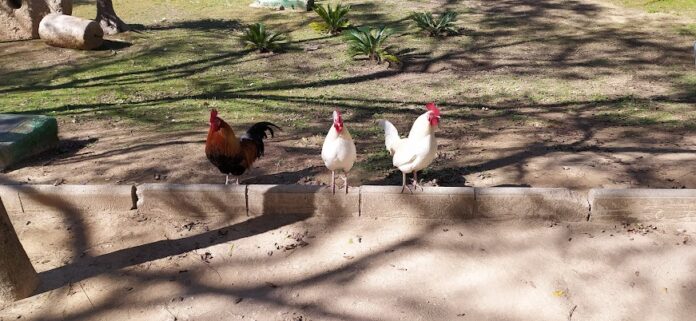It is a common occurrence to see unusual birds wandering through the streets of Torrevieja, namely the likes of hens, and after previously threatening to take action to eradicate them, the local government is now making plans to gather them all up and send them to bird prison, or, more truthfully, to a school farm.
This was announced during the last plenary session by the Councillor for Animal Protection, Concha Sala, after being asked about the matter by the PSOE spokesperson, Bárbara Soler.
Many of the birds originate from the Parque de las Naciones, where numerous collections of wildlife previously lived, including the likes of iguanas, but were removed amid criticism of their neglect under the care of the town hall, whom, amongst other complaints, were accused of starving the animals.
Some of the birds who remained have been known to wander onto the surrounding roads, including the N-332, sometimes with fatal consequences, but others have just taken it upon themselves to wander freely through the town, relocating in areas as far as the Aldi supermarket near the hospital, and also the Acequión health centre, amongst other places.
Sala revealed in the plenary session that the animals in the Parque de las Naciones are fed first thing in the morning and coinciding with the opening of the premises by municipal workers. These, she explained, give them specific feed for birds. A diet that, in addition and according to the councillor, is complemented by the stale bread that the workers receive in bags from the hands of neighbours. A practice that, nutritionally, is questioned by some biologists and pointed out as not very suitable for the health of these birds.
In order to stop their proliferation, Sala pointed out that, for the sake of the lives of these animals which normally do continue to live freely, the council is processing an order so that, with external means contracted by the council, they can be transferred in safe conditions to a school farm, where they can be given the proper care, although the location is yet to be revealed as there have been difficulties finding a location which can accommodate them, where, given the numbers, they would no doubt be caged, assuming of course they could all be rounded up.
For his part, the mayor, Eduardo Dolón, criticised the human residents who, in good faith, feed the birds in places other than the Parque de las Naciones. A behaviour, the mayor stressed, that helps these birds to disperse and end up in central areas of the city.
Clearly expressing his dislike of anything natural in the town, Dolón also had to point out that if he wanted to, he could cull all of these specimens through an emergency contract. He did then go on to say that killing them all is ruled out, perhaps making bird prison a better option for them.
Both killing and imprisoning the birds are in stark contrast to how they are treated in neighbouring Guardamar, where one of the main attractions in the town is a park awash with wildlife able to roam freely.





